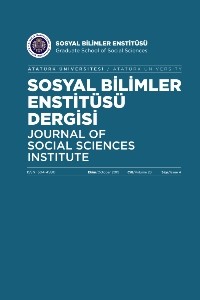Karakterin Zihin Dili Olarak Monolog ve Sam Shepard’ın “Ölümüne Oyun” ve “Melekler Şehri” Oyunlarında İncelenmesi
Abstract
Monolog için en basit açıklama; “tek bir kişinin yaptığı konuşma ya da kişinin kendisiyle diyaloğudur”. Tiyatro metinlerinde monolog genellikle oyun kişilerinin gizli yanlarını ve iç dünyasını ortaya çıkarmak üzere yazılmıştır. Bu sayede seyirciler oyun kişilerine tam olarak hakim olurlar, kişinin zihnine ortaklık ederler. Dolayısıyla monoloğun görevi oyun kişisinin yaşamını eksiksiz olarak sunmaktır. Modern dönemde klasik oyunlar monoloğu bu şekilde geleneksel olarak kullanırlar. Ancak modern sonrası dönemde monoloğun işlevi değişir. Artık karakterin zihin dilidir. Merkezden kaçan, bütünlüklü olmayan oyun kişisinin zihni konuşur.. Bunu yaparken oyun kişisinin sesi tutarlı değildir. Pek çok sesi vardır. Oyun kişileri konuşmak ister, duyulmak ister ama bunu başkalarına açıklama isteğiyle olup olmadığı belirsizdir. Sam Shepard’ da oyunlarında monoloğu parçalanmış benliklerin sesi, zihinsel faaliyetlerinin ifadesi olarak kullanır. Dış aksiyonun zayıf olduğu bu oyunlarda oyun kişileri kendileri ile bir hesaplaşma içindedir. Bunu yaparken oyun kişisi polifonik konuşur. Farklı sesler, farklı bilinçler devreye girer
Keywords
References
- 1-Geis, D. (1995), Postmodern Teatric(k)s, Michigan: The University of Michigan Press
- 2-Hamburger, K. (1973) .The Logic of Literatur. (Çev. Marilynn J. Rose). Indiana University Press
- 3-Elam, K. (1980).The Semıotıcs Of Theatre And Drama. Methuen & Co. Ltd
- 4-Goffman, E. (1974). Frame Analysis, Northeastern University Press
- 5-Crank, J. (2012). Understanding Sam Shepard. South Carolina: The University of South Carolina Press
- 6-Dorrit, C. (2008). Şeffaf Zihinler. (Çev. Ferit Burak Aydar). İstanbul: Metis Yayınları
- 7-Fuchs, E.(1996). Karakterin Ölümü. (Çev. Beliz Güçbilmez). Ankara: Dost Kitabevi Yayınları
- 8-Dürrenmatt, F. (1995). Tiyatronun Sorunları. (Çev. M. Osman Toklu )Ankara: Gündoğan Yayınları
- 9-Esslin, M. (1996). Dram Sanatının Alanı. (Çev: Özdemir Nutku) . İstanbul: Yapı Kredi Yayınları
- 10-Pavis, P. (1999). Sahneleme, Kültürler Kavşağında Tiyatro. (Çev. Sibel Kamber). Ankara: Dost Kitabevi Yayınları
- 11-Pavis, P. (1999) Dictionary of the Theatre. University of Toronto Press.
- 12-James Hirsh, Shakespeare and the History of Soliloquies,2003)
- 13-Ken, F. (1985). Genius and Monologue. Cornell Unıversıty Press
- 14-Shepard, S.(2003). Sam Shepard Toplu Oyunlar 2. (Çev. Şükran Yücel). Ankara: Dost Kitabevi Yayınları
- 15-Beckett, S. (1965) Mutlu Günler. (Çev.Akşit Göktürk). De yayınları
- 16-Strindberg, A. (1962) Rüya Oyunu.(Çev: Afif Obay).Ankara: Milli Eğitim Bakanlığı Yayınları
Analysis of Character as Monologue of Language Mind in Sam Shepard’s Plays "The Tooth of Crime " and "Angel City”
Abstract
The simplest explanation for the monologue; "One person's conversation or one's own dialogue. Monologue in theater texts is usually written to reveal the hidden sides and inner world of the actors. In this way, the audience will have full control of the actors. The important thing here is to partner with the mind of the person. In this respect, the task of the monologue seems to present the life of the game person in full. In the modern era, classical games traditionally use monologue in this way. However, the function of the monologue changes in the post-modern period. It is now the language of the mind of the character. The mind of the game person who escapes from the center, who is not integrated speaks. In doing so, the voice of the game person is not consistent. It has many voices. Characters want to talk, want to be heard, but it was unclear whether they were willing to explain this to others. Sam Shepard uses the monologue in his plays as the voice of fragmented selves, as an expression of their mental activity. In these plays when external action is weak, the characters are in a showdown with themselves. In doing so, characters speaks polyphonically. Different voices, different consciousnesses come into play.
Keywords
References
- 1-Geis, D. (1995), Postmodern Teatric(k)s, Michigan: The University of Michigan Press
- 2-Hamburger, K. (1973) .The Logic of Literatur. (Çev. Marilynn J. Rose). Indiana University Press
- 3-Elam, K. (1980).The Semıotıcs Of Theatre And Drama. Methuen & Co. Ltd
- 4-Goffman, E. (1974). Frame Analysis, Northeastern University Press
- 5-Crank, J. (2012). Understanding Sam Shepard. South Carolina: The University of South Carolina Press
- 6-Dorrit, C. (2008). Şeffaf Zihinler. (Çev. Ferit Burak Aydar). İstanbul: Metis Yayınları
- 7-Fuchs, E.(1996). Karakterin Ölümü. (Çev. Beliz Güçbilmez). Ankara: Dost Kitabevi Yayınları
- 8-Dürrenmatt, F. (1995). Tiyatronun Sorunları. (Çev. M. Osman Toklu )Ankara: Gündoğan Yayınları
- 9-Esslin, M. (1996). Dram Sanatının Alanı. (Çev: Özdemir Nutku) . İstanbul: Yapı Kredi Yayınları
- 10-Pavis, P. (1999). Sahneleme, Kültürler Kavşağında Tiyatro. (Çev. Sibel Kamber). Ankara: Dost Kitabevi Yayınları
- 11-Pavis, P. (1999) Dictionary of the Theatre. University of Toronto Press.
- 12-James Hirsh, Shakespeare and the History of Soliloquies,2003)
- 13-Ken, F. (1985). Genius and Monologue. Cornell Unıversıty Press
- 14-Shepard, S.(2003). Sam Shepard Toplu Oyunlar 2. (Çev. Şükran Yücel). Ankara: Dost Kitabevi Yayınları
- 15-Beckett, S. (1965) Mutlu Günler. (Çev.Akşit Göktürk). De yayınları
- 16-Strindberg, A. (1962) Rüya Oyunu.(Çev: Afif Obay).Ankara: Milli Eğitim Bakanlığı Yayınları
Details
| Primary Language | Turkish |
|---|---|
| Journal Section | Makaleler |
| Authors | |
| Publication Date | March 27, 2021 |
| Published in Issue | Year 2021 Volume: 25 Issue: 1 |



